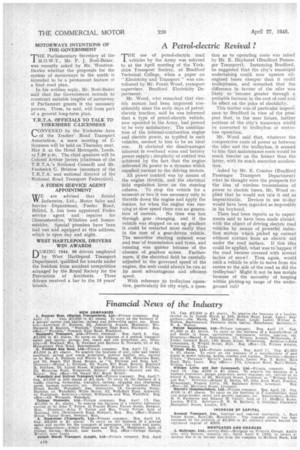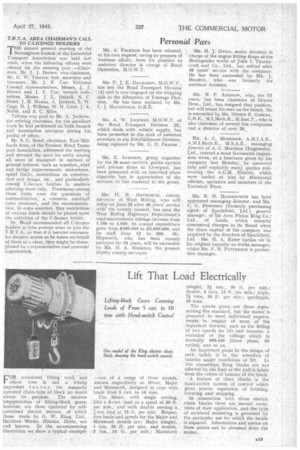A Petrol-electric Revival?
Page 20

Page 21

If you've noticed an error in this article please click here to report it so we can fix it.
THE use of petrol-electric road vehicles by the Army was referred to at the April meeting of the Yorkshire Transport Society, at Bradford Technical College, when a paper on " Electricity and Transport" was contributed by Mr. Frank Wood, transport supervisor. Bradford Electricity Department.
Mr. Wood, who remarked that electric motors had been improved considerably since the early days of petrolelectric traction, said he was informed that a type of petrol-electric vehicle, now operated in the Army, had proved to he very satisfactory. The combination of the internal-combustion engine and electric power, as typified in such vehicles, seemed to him to be an ideal one. It obviated the disadvantages inherent in overhead wires and battery power supply; simplicity of control was achieved by the fact that the engine delivered its power to a dynamo which supplied current to the driving motors.
All power control was by means of the engine throttle, and the electrical field regulation lever on the steering column. To stop the vehicle for a moment or two it was necessary only to throttle down the engine and apply The brakes, for when the engine was running at slow speed there was no genera-.
tion of current. No time was lost through gear changing, and if, the vehicle was stopped on an up gradient it could be restarted more easily than in the case of a gear-driven vehicle. The smoother starting reduced wear and tear of transmission and tyres, and running was quieter because of the • absence of gearbox noises. Furthermore, if the electrical field be carefully adjusted to the governed speed of the engine, the unit could always be run at its most advantageous and efficient speed.
With reference to trolleybus opera.: tion, particularly for city work, a ques
tion as to operating costs was raised by Mr. E. Hayhurst (Bradford 'Passenger Transport). Instancing Bradford, he suggested that the city's municipal undertaking could now, operate oilengined buses cheaper than it could trolleybuses, a-nd remarked that the difference in favour of the oiler was likely to bec.ome greater through a probable increase in the cost of coal and its effect on the price of electricity. , This matter was of particular importance to Bradford in view of the pros'poet .that, in the near future, further sections of the city's tramways would be converted to trolleybus or motorbus operation.
Mr. Wood said that, whatever the comparative costs of power as between the oiler and the trolleybus,. it seemed to him that maintenance costs would he much heavier on the former than the latter, with its Much smoother aceeleration.
Asked by Mr. E, Cousins (Bradford Passenger Transport Department) what he thought were the prospects for the idea of wireless. transmission of power to electric buses, Mr.. Wood replied that he would not 'rule it Out as intpracticable. Devices in uSe to-daY would .have been regarded as impossible in his boyhood. • . There had been, reports as to experiments said to have been made abroad, with the object of driving electric road vehicles by means of powerful induction motors which picked up current without contact from an electric rail under the road surface. If this idea could be applied, what was td happen if the road became covered with several inches of snow-? Then again, • would such a vehicle be able to move from the centre to the ,side of the road as did the trolleybus? Might it not be less mobile because of the necessity of keeping within picking-up range of the underground rail? T.R.T.A, AREA CHAIRMAN'S CALL TO C-LICENCE HOLDERS
THE annual general meeting of the
HE branch of the Industrial Transport Association as held last week, when the following officers were elected for the ensuing year:—Chairman, Mr. J. J. Brown; vice-chairman, Mr. G, W. Travers; hon. secretary and treasurer, Mr, J. F. Coe; National Council representatives, Messrs. J. J. Brown and J. F. Coe; branch committee, Messrs. J. L. Dalzell, S. C. ,Bond, J. M. Hanna, A. Jackson, L, W. Gage, H. J. Wilkins, W. H. Gant, J. A. Noble, and A. C. Miles.
Tribute was paid to Mr, A. Jackson, the retiring chairman, for the excellent work he had perfOrmed on both branch and Association accounts during his period of office.
Mr. S. C. Bond, chairman, East Midlands Area, of the Traders' Road Trans. port Association, addressed the meeting ' and stressed the need for unity among all users of transport in matters of general interest, such as taxation,i road and bridge improvements, motorways, speed limits, restrictions on construction and design, etc., and particularly arnorq C-licence holders in matters affeeting them only. Prominent among these items were the questions of nationalization, a common road-rail rates structure, and the recommenda. tion, in some quarters, that restrictions of various kinds should be placed upon the activities of the C-licence holder.
Mr. Bond recommended all C-licence holders to take prompt steps to join the T.R.T.A., So that if it became necessary for decisive action to be taken on•behall of them as a class, they might he championed by a representative and powerful organization.




















































